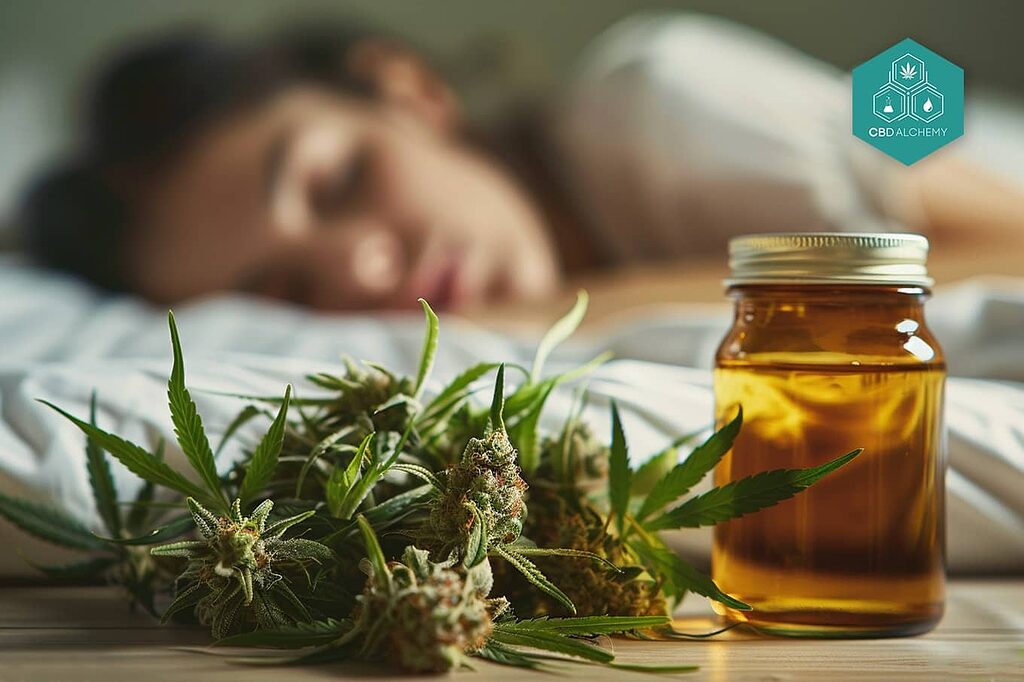
Over the years, the use of cannabidiol (CBD) has found its place among alternative solutions to sleep disorders. This non-psychoactive compound derived from hemp is attracting growing interest from those seeking to improve their quality of life. In this article, we’ll look at consumers’ experiences, their impressions and the effects they’ve observed following the use of CBD for sleep.
The CBD craze: a response to sleep disorders
What motivates consumers to try CBD?
Many people turn to CBD for its relaxing and anxiolytic properties. People suffering from insomnia or sleep disturbed by stress and anxiety often find relief with this natural product. CBD is known to help people fall asleep more quickly and reduce night-time awakenings, thus promoting deep, restful sleep.
Testimonials show that CBD significantly reduces symptoms associated with reduced anxiety and reduced stress. These benefits are said to contribute to the overall improvement in sleep quality for many users, explaining its growing popularity among those seeking alternatives to traditional sleeping pills.
The relaxing effect of CBD: myth or reality?
Many people confirm that they feel a relaxing effect when they take CBD to sleep before bedtime. This sensation seems to facilitate falling asleep while minimizing disruption of the sleep cycle. However, this effect varies according to several factors, such as the dose ingested, the concentration of the product, and the individual constitution of each consumer.
Some scientific studies suggest that CBD may positively influence the receptors in the brain responsible for controlling sleep. So, while each user’s experience is unique, a majority report satisfaction with using CBD for better sleep.
Testimonials from consumers who have used CBD for sleep
Different but often positive experiences
It’s essential to consider that consumer opinions when it comes to CBD can vary widely. For example, 45-year-old Marie reports that she falls asleep almost instantly after using a few drops of CBD oil each night. As for Lucas, 30, he notes a marked reduction in night-time awakenings since incorporating CBD into his night-time routine.
Other users report a noticeable improvement in their deep, restful sleep. Sophie, for example, says that before discovering CBD, she constantly dreaded her restless nights. Today, her sleep seems like “a logically peaceful sequence”.
How do some people adjust their consumption?
The method of administering CBD differs from one individual to another. Sublingual oils enjoy great popularity thanks to their rapid absorption, enabling an almost immediate effect. Others prefer capsules, which offer a prolonged, steady release of active compounds overnight.
- Sublingual oils: Ideal for rapid onset of action.
- Capsules: For slow release over several hours.
- CBD gummies: Easy to dose, with a gentle action.
CBD’s impact on sleep patterns: a long-term perspective
Legal developments and growing acceptability
Evolving regulations on CBD also contribute to its democratization. In Europe, legislation is becoming more flexible, facilitating access to compliant, standardized products. Increased consumer confidence in this substance is also based on quality certifications issued by third-party laboratories verifying product purity and authenticity.
At the same time, the social acceptability of CBD is rising significantly, leading to more open and accepted use. Far from being stigmatized, CBD is now seen as the supplement of choice, respectful of the body’s natural needs.
Perennial use of CBD for sleep
In the long term, integrating CBD into the daily routine opens the door to more autonomous management of sleep disorders. By offering an alternative to both more invasive pharmaceutical treatments and certain rigid behavioral approaches, CBD seduces with its approach that respects each individual’s biological rhythm.
The gradual improvement in sleep quality reported often leads to a virtuous loop in which restorative sleep feeds into better stress management the following day, creating a continuous beneficial cycle.
Future prospects and innovations around CBD
The crucial role of scientific research
If the popularity of CBD in all its forms cannot be ignored, it is above all thanks to the growing support of scientific research, which is gradually validating its beneficial effects. Further studies will help us to understand more deeply the exact mechanism by which this cannabinoid impacts our sleep cycles.
Innovation never sleeps: between the development of new, more targeted formulas and the exploration of synergistic associations with other plants or nutrients, the future promises to make CBD even better adapted to the multiple challenges of modern sleep.
The emergence of new consumer practices
Consumer practices are evolving alongside these advances, and some, such as CBD-enriched aromatherapy, are gaining ground. Whether they come from humble bottles or by ambient diffusion, these inclusive modes look to the future thanks to the enhanced relaxing effect they provide.
From a normative point of view, vigilance remains crucial to regulate sales practices and guarantee optimal user safety, thus perpetuating the bond of trust between serious manufacturers and informed consumers.
Answers to frequently asked questions about CBD and sleep
What dosage of CBD is recommended to improve sleep?
CBD dosage varies according to various personal factors such as weight, tolerance and severity of sleep disorders. It is generally advisable to start with small doses (10-20 mg) and gradually adjust according to the effects felt. A medical consultation can guide you in adapting the dosage to your specific needs.
How long before bedtime should I take CBD?
To maximize the relaxing effect of CBD, we recommend taking it around 30 to 60 minutes before bedtime. This allows the body to fully absorb the cannabidiol, ensuring a calm transition to sleep.
Does CBD have any undesirable side effects on sleep?
Although CBD is generally well tolerated, some users may experience mild side effects, such as fatigue, dry mouth or changes in appetite. These reactions are often temporary, and disappear as the body adjusts. Adjusting the dose can limit these side effects.
Can CBD interact with other sleep medications?
CBD can potentially interact with certain medications used to treat sleep disorders. It is therefore essential to consult a healthcare professional before combining CBD with other drug treatments, to avoid harmful interactions.






